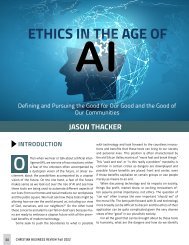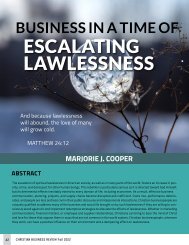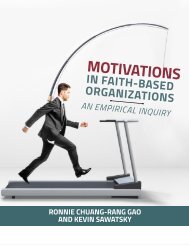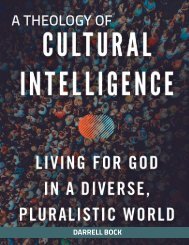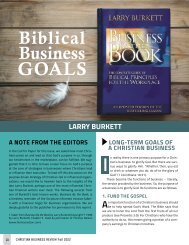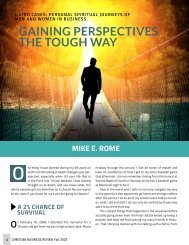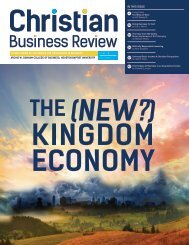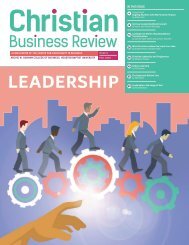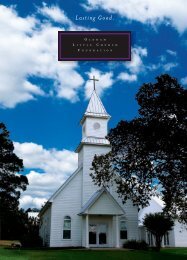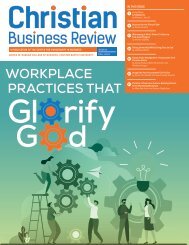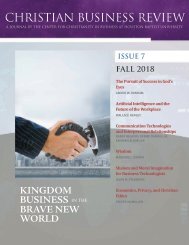Christian Business Review 2022: Pressing On Toward God's Goal
Create successful ePaper yourself
Turn your PDF publications into a flip-book with our unique Google optimized e-Paper software.
BUSINESS IN A TIME OF LAWLESSNESS<br />
CBR PEER REVIEWED ARTICLES<br />
“In those days there was no king in Israel; everyone did<br />
what was right in his own eyes”<br />
(Judg.17:6; 21:25).<br />
INTRODUCTION<br />
S<br />
uch is the essence of spiritual lawlessness. If everyone<br />
does what is right in his own eyes, then<br />
people have made themselves their own gods,<br />
unrestrained by accountability to an all-powerful<br />
deity. In a society dominated by such lawlessness, men<br />
and women claim unlimited self-determination strictly as a<br />
function of their own predispositions and preferences; they<br />
grant no one else the moral authority to dictate otherwise,<br />
including the Creator and Sustainer of the universe.<br />
Not only is such belief destructive to the individual, if pervasive,<br />
it signals escalating decline and ruin throughout a<br />
culture via a variety of symptomatic manifestations. We can<br />
expect the deleterious effects of this spiritual lawlessness<br />
and impoverishment to be felt in every domain of human<br />
endeavor: family, law, government, medicine, education, religion,<br />
and others. <strong>On</strong>e such symptom of spiritual lawlessness<br />
is the deterioration of factors conducive to a prosperous<br />
economy. As this condition escalates, it leads to losses<br />
that threaten the very basis for capitalism. Freedom under<br />
God creates opportunities that—in varied forms—reduced<br />
poverty and brought higher standards of living through enhanced<br />
economic success and productivity to many countries<br />
around the world. Freedom apart from God inevitably moves<br />
toward anarchy.<br />
In this article, I first examine the biblical perspective on<br />
spiritual lawlessness, which results—both in the case of the<br />
lawless individual and in the case of a society made up of a<br />
critical mass of spiritually lawless citizens—in a variety of<br />
undesirable effects across all human domains. I then briefly<br />
cite some evidence that spiritual lawlessness is an increasing<br />
threat to US society. Finally, I discuss some possible ways<br />
that <strong>Christian</strong> businesspeople might frame their responses<br />
to mitigate the damage inflicted by rampant lawlessness and<br />
to advance redemptive measures for customers, suppliers,<br />
and employees as well as the culture at large.<br />
BIBLICAL PERSPECTIVES<br />
ON THE NATURE AND<br />
PRACTICE OF<br />
LAWLESSNESS<br />
LAWLESSNESS DEFINED<br />
The concept of lawlessness is expressed in the Old Testament<br />
by more than 20 different Hebrew words. However, the<br />
notion of unbelief and disobedience toward God pervades<br />
the underlying thrust of these words, demonstrated in that<br />
the Septuagint (LXX) uses only one Greek word, and in each<br />
case the word is the same word for lawlessness as used in<br />
the New Testament. 1 That word (Gr. ἀνομία) means a “state<br />
or condition of being disposed to what is lawless” or “a lawless<br />
deed.” 2 It is important to note that necessarily a dependency<br />
exists between spiritual lawlessness and overt acts<br />
of lawlessness: A spiritually lawless mind produces overtly<br />
lawless deeds.<br />
However, biblical teaching on lawlessness is more all-encompassing<br />
than merely cases of breaking civil or criminal<br />
law. Lawlessness, which makes its first appearance in the<br />
garden, is, at its core, the condition of the human heart,<br />
which acts both in unbelief toward the word of God (Eve) and<br />
in conscious disobedience to God’s instruction (Adam) (1 Tim<br />
2:14). 3 As the Lord himself said, “The good man out of the<br />
good treasure of his heart brings forth what is good; and the<br />
evil man out of the evil treasure brings forth what is evil; for<br />
his mouth speaks from that which fills his heart” (Luke 6:45).<br />
Scripture gives us more detail about the nature of lawlessness.<br />
For example, John tells us that “Everyone who practices<br />
sin also practices lawlessness; and sin is lawlessness”<br />
(1 Jn 3:4), so we do not have to look very far to find lawlessness.<br />
It thrives in each of us, barring a faith commitment to<br />
Jesus Christ and the restraining influence of the Holy Spirit<br />
within each believer. Thus, lawlessness as defined biblically<br />
does not merely refer to obvious overt transgressions, although<br />
it certainly includes those. Rather, lawlessness is the<br />
manifestation of a sinful heart and mind that rejects God’s<br />
word and instruction to pursue independence and disobedience<br />
instead.<br />
In contrast, believers in Christ, who are also his ambassadors<br />
to a world that increasingly advocates and portrays<br />
lawlessness, should present a completely different character<br />
and orientation to all aspects of life, including how they<br />
CHRISTIAN BUSINESS REVIEW Fall <strong>2022</strong> 432




